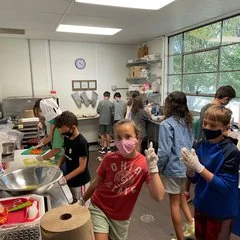Cooking for Learning: Using Food to Connect Your Student's Skills
"Cooking for Learning: Using Food to Connect Your Student's Skills"
By SJMS Upper Elementary teacher, Jennifer Robertson
Every culture and human community in the world has traditions around food and cooking. Cooking and eating are so ubiquitous that in the Montessori Cosmic Curriculum, food is part of the Fundamental Needs of Humans presentation, and students are invited to consider the many ways in which humans meet their nutritional needs throughout history. Food is a part of our everyday lives, and exploring the world of food and cooking provides great opportunities for students to practice skills from many different subject areas
Read More
The Benefits of Working with Clay
The Benefits of Working with Clay by SJMS Art teacher, Roxanne Holonitch
When you think about ceramics, academics is not usually the first thing that comes to mind. Yet the importance of using clay in schools and at home is deeply connected to the strengthening of muscles used to properly grip and hold pencils. Clay is also a medium where children can express their thoughts in a tangible and meaningful manner.
Read More
Executive Function Skills
Executive Function Skills by SJMS Middles School Teacher Brian Lower
Reading, Writing, Arithmetic...these are the foundations we all remember when it comes to education and school! Yet there is so much more to education than those items -- practical life skills, socialization, and a group of skills that often gets overlooked Executive Function Skills. The term Executive Function Skills or EF, has come into vogue over the last few years, yet what does EF mean and why is it so important?
Read More
Cosmic Education in the Elementary Classroom
Cosmic Education in the Elementary Classroom by SJMS Lower Elementary 1 teacher Jessika Casey
“Peace is what every human being is craving for, and it can be brought about by humanity through the child” Dr. Maria Montessori.
In the Elementary environment, all of our studies are based on Cosmic Education. The aim of the Cosmic Education lessons are to appeal to the students' reasoning mind and robust imagination. This is done by sharing stories, doing experiments, the use of charts, timelines, and demonstrations. The lessons are typically given in small groups to support the students' social needs. Having these needs met at the elementary level supports lifelong learners and leads them to understand that they have a cosmic task. This supports Dr. Montessori’s belief that peace comes from the child.
Read More
SJMS Art Studio
SJMS Art Studio by SJMS Art teacher, Roxanne Holonitch
This summer, the art room was transformed into an Art Studio. With some sweat, elbow grease, paint, and heavy lifting, the space has been re-energized!
Read More
Why Observe?
Why Observe? by SJMS CH1 Teacher Pen Ripke
In her book, To Educate the Human Potential, Dr. Montessori states “the first step in becoming a Montessori teacher is to shed omnipotence and to become a joyous observer. If the teacher can really enter into the joy of seeing things being born and growing under his own eyes and clothe himself in the garment of humility, many delights are reserved for him that are denied to those who assume infallibility and authority in front of the class”.
Read More







